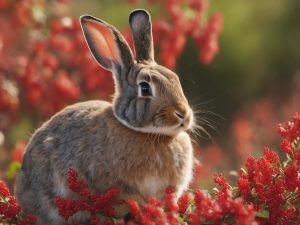Can Rabbits Eat Barberries? Preparation, Quantity, Safety & Nutritional Tips: A Diet & Health Guide

Your Bunny’s Diet: A Quick Glimpse
Every rabbit owner knows that our fluffy companions have specific dietary needs. While
Rooting Around: Barberry Roots
To kick things off, let’s start underground. The root is usually what plants absorb nutrients from, and in some cases, they might offer health benefits when consumed.
Safety First:
Barberry roots have been used in various traditional medicines. For rabbits, however, there’s no solid evidence supporting its safety or nutritional benefits. While it’s not toxic, it’s better to err on the side of caution and avoid giving your rabbit barberry roots.
Nutritional Overview:
Even if you do decide to introduce barberry root to your rabbit’s diet, remember that it doesn’t offer a significant nutritional boost. Keep the main staples of hay, greens, and pellets as the focus.
Branching Out: Barberry Stems
These thorny structures are an integral part of the barberry plant. But are they bunny-approved?
Safety Check:
Barberry stems are non-toxic to rabbits. However, those thorns can be problematic. If you ever decide to offer stems, ensure they’re thoroughly cleaned and free from thorns to prevent any potential harm.
Preparation Tips:
Rinse the stems under cool water and pat dry. Remove any thorns using kitchen shears or a sharp knife. Cut into small, manageable pieces for your rabbit to nibble.
Leafy Greens: Barberry Leaves
Many rabbit owners swear by leafy greens. Could barberry
Safety Above All:
Barberry leaves are safe for rabbits to consume in moderation. They are non-toxic and can be a refreshing treat.
Nutritional Insights:
These leaves provide a slight boost of vitamins, but they shouldn’t replace your rabbit’s primary
Quantity Guidelines:
Offer a couple of leaves once or twice a week as part of a varied diet. Observe your rabbit after introducing any new food to ensure they’re not experiencing digestive issues.
Berries & Bunnies: Barberry Berries
The bright berries can be tempting. Let’s see if they’re rabbit-friendly.
Safety Roundup:
Barberry berries are safe for rabbits in small amounts. Overfeeding can lead to digestive upsets, so moderation is key.
Nutritional Pointers:
These berries provide some antioxidants and vitamins. They’re a sweet treat but should be limited in quantity.
How Much Is Too Much?
Think of barberry berries as a treat. A couple of berries once a week is more than enough.
A Diet & Health Guide Recap: Bringing It All Together
Feeding our rabbits is not just about filling their bowls; it’s about ensuring their health and longevity. When it comes to barberry:
- Roots: Best avoided. They don’t offer a clear nutritional benefit for rabbits.
- Stems: Safe if thorn-free. Always prepare with care.
- Leaves: A safe, occasional treat. Don’t replace main food items.
- Berries: A sweet treat in moderation.
Remember, rabbits thrive on a consistent diet. While exploring new foods can be exciting, always make gradual introductions and monitor for any changes in behavior or digestion. Because when it comes to our bunnies, their health always hops first!
Note: This guide is a general overview, and it’s always best to consult with a vet or rabbit nutrition expert before making significant changes to your pet’s diet.
What nutrients in barberry is good about for Rabbits to Eat
| Feature | Description | References |
|---|---|---|
| High in carbohydrates | Barberry fruit contains 16.24% carbohydrates | 2, 3 |
| Low in fat | Barberry fruit contains only 1.16% fat | 2 |
| Contains protein | Barberry fruit contains 2% protein | 2 |
| Source of antioxidants | Barberry fruit contains total phenolics and total anthocyanin | 3, 4 |
| Boosts immune function | Dietary administration of barberry fruit extract has been shown to boost immune parameters in Siberian sturgeon | 4 |
| Supports liver and gallbladder health | Barberry is known to help cleanse the liver and gallbladder | 1 |
| Supports digestive health | Barberry can help cleanse the digestive system | 1 |
References:







Leave a Reply